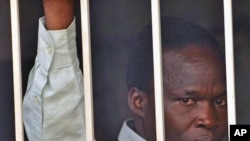An international rights group is raising concerns about Uganda’s first trial of a former leader of the rebel group known as the Lord’s Resistance Army.
In a report released Monday, Human Rights Watch says that legal and organizational problems threaten to jeopardize the pursuit of justice in the trial of Thomas Kwoyelo.
The defendant was taken into custody in 2009 after fighting for the LRA. The group is notorious for committing rights abuses during the two decade-long conflict in northern Uganda. Several of its leaders are wanted by the International Criminal Court.
But Kwoyelo is being tried by a Ugandan court known as the International Crimes Division, or ICD. His is the first case the ICD is handling.
Elise Keppler of Human Rights Watch said it is important that as many trials as possible be conducted on a national level instead of at the International Criminal Court.
“Ideally, trials for all crimes, including the most serious crimes, should be conducted nationally. That is the best way to ensure that they have meaning with the communities most affected by the crimes, and that they can build respect for rule of law in the country. It is vital for national courts to ultimately be in the position to have these kinds of cases,” said Keppler.
In Kwoyelo’s case, though, the international watchdog group points to several problems. One is Uganda’s Amnesty Act, which has been applied to some other LRA fighters. Keppler said no one should ever be granted amnesty for the types of crimes of which Kwoyelo is accused.
“Uganda has, essentially, a blanket amnesty for those who renounce rebellion in Uganda. And of course, amnesties for the worst crimes - for crimes against humanity and genocide - are wholly inconsistent with international law," said Keppler. "This is obviously a huge challenge for the work of the International Crimes Division. How it can move forward with trying to pursue justice for the most serious crimes in the face of this domestic amnesty?”
Stephen Oola, a lawyer with the Kampala-based Refugee Law Project, said that because the LRA is still active, there is little chance of changing the Amnesty Act at this time.
“The politicians are in a Catch-22 situation. They don’t know exactly whether or not they can get the LRA bigwigs. If not, do they need to negotiate with them? If so, would tampering with the Amnesty Act take away that incentive to negotiate? No one would come back home if they know they are going to be prosecuted the next day,” said Oola.
Human Right Watch says other problems for the trial include inadequate resources for the defense, a lack of witness protection programs, and insufficient outreach to explain the trial to the local community.
The rights group says it also is important that the court be allowed to try members of the Ugandan Army, some of whom have been accused of serious crimes during the conflict in northern Uganda.
Lawyer Oola agrees that trying army officers is important, to demonstrate a commitment to accountability. He said, however, that is unlikely to happen in Uganda under the current administration.
“The only way you can gauge whether the government has the political will is if it allows the war crimes division to try its own agents. I don’t see that happening in this particular government. That kind of will is still lacking, and is not about to change,” said Oola.
Although Kwoyelo is the first person to be tried by the ICD, Oola said many people in Uganda already have the impression that the court will be used only to prosecute those fighting against the government. National trials are indeed important, he said, but only under the right conditions.
“If well managed, it would have a very powerful impact on the people, but if mismanaged the result is the opposite. Initially I thought there was a lot of enthusiasm about Kwoyelo’s trial, but I’m not sure that is the feeling now," said Oola. "Initially it was seen as some serious step towards accountability. Lately a lot of people think it’s basically the usual pattern of victor’s justice. That makes justice lose its meaning.”
Spokesman for the Uganda judiciary, Erias Kisawuzi, said the Human Rights Watch report makes a number of valid points, and he welcomes its recommendations.
“By and large the report is a reflection of what is on the ground, and it also has proposed quite a number of reforms, which I think are very timely. If they are addressed I think it will go a long way in having the suspect or any other person tried in a fair and impartial manner,” said Kisawuzi.
Keppler of Human Rights Watch said it will take firm political backing from Uganda's government for justice to be served to Kwoyelo. She added that despite certain problems, the trial nonetheless offers important lessons to other countries considering prosecuting their own serious crimes.
Rights Group Sees Problems in Uganda's First LRA Trial




